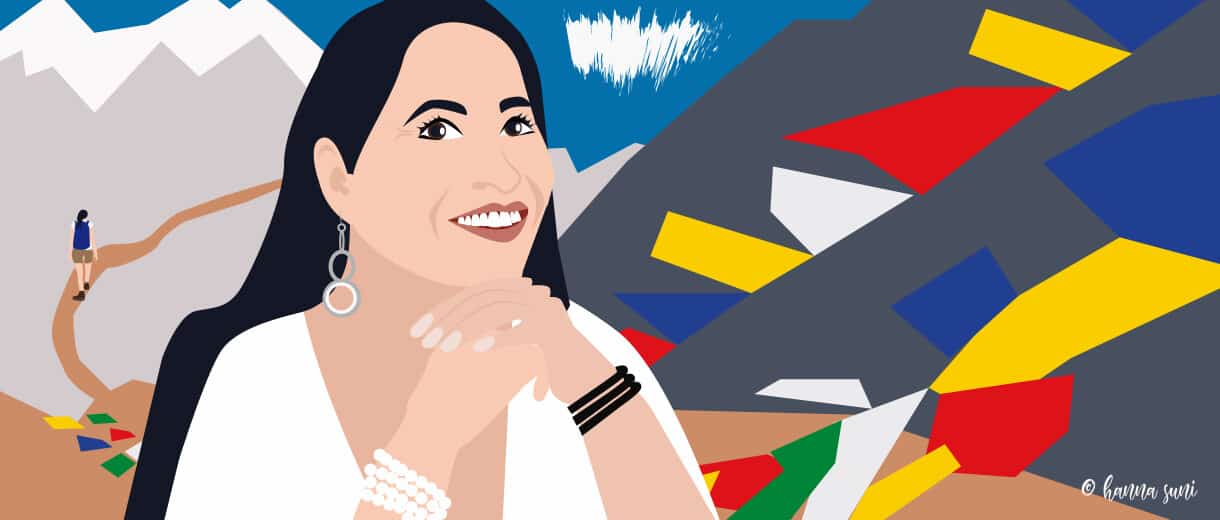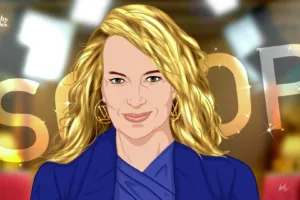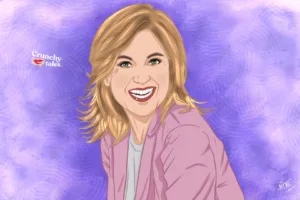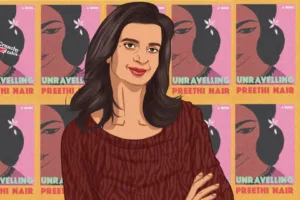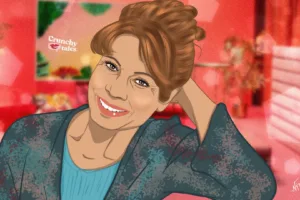Author Maria Olsen: “Midlife Happiness Is More Akin To Serenity”
Maria Olsen, 53, grew up brown in a sea of white and always felt different. She learned to please others and adapt herself to fit in, making sure everyone around her was content – everyone except her. For years she drowned her sorrows with alcohol, but at 50 came to a halt and decided it was time to radically change direction. Pursuing fifty life-changing quests that took her out of her comfort zone helped her find peace and happiness. Radio talk show co-host, women’s writing and empowerment coach, mentor, public speaker, author, recovery sponsor and attorney, Maria has more than one string to her bow and shows us that it’s never too late to improve, change and thrive.
Maria, you reinvented yourself and transformed your life in almost every one of its aspects when you turned 50. What prompted you to do such a radical transition? Where did you find the inspiration and strength to carry on despite all the difficulties you faced?
At age 50, I got divorced, sober and became an empty nester. I was living alone for the first time in my life. Everything in my life had to change, but I felt rudderless. I am a goal-oriented list-maker by nature and, when a friend suggested I celebrate my 50th year by trying 50 new things, I seized the opportunity. The project gave me direction. It allowed me to examine the contours of how I wanted to live the next chapter of my life. As people around me learned about my plan to try 50 new things, they wanted to see my list and to learn more. I realized that I could help other people with my experience, which gave me the strength to persevere after my life unravelled. As I saw my endeavour’s resonance with so many people, I turned it into a book, 50 After 50: Reframing the Next Chapter of Your Life. The book and the talks I have done that cover themes in it (like becoming your best version by practising self-care, healing from trauma or de-stressing tactics for busy people) have become vehicles for turning my pain into a force for good in the world.
You gave up your career as a lawyer for many years to be a stay-home mom to your two children and later found yourself empty-nested and feeling lost and worthless. What advice would you give women who are currently struggling with having a family and leading successful work-lives?
I was lucky to have had the opportunity to be an at-home mom. And I treasured the time I had with my children. As in all things, however, balance is beneficial. If I could have a do-over, I would have done more things to continue to help me grow that had nothing to do with being a mom. If that had involved a job I was passionate about, I would have returned to work when my children entered adolescence and started to push me away in terms of not needing me as much. But I had put all of my eggs in the motherhood basket and lacked a belief in my self-worth. Aside from being a mom, I had not found my “why.” I had a lot of work to do on accepting myself and not running from the rocks of self-judgment and secrets I had been carrying around involving my own childhood trauma. Not dealing with trauma is like holding a beach ball underwater: It takes a tremendous amount of mental energy and, when not vigilant, the “ball” can pop up in unexpected ways. Until I found a way to love myself, I was not going to be the most effective partner, mother, friend, attorney or anything else. It was not until I turned 50 that I truly undertook the work that helped me heal.
Your mother is from the Philippines and in many Asian cultures, older men and women are revered and respected. Yet, in the strongly biased Western cultures ageism, reigns and people are chasing their youth even through self-harming actions. What have you learned from the age-positive cultures of your mother and others that you have visited during your travels? Have you encountered ageism? How did you react?
You are right—in Asian cultures, older men and women generally are revered and respected. There is a form of address you add to the Filipino language to show respect to elders for which I do not see an equivalent in Western cultures. I have learned through my mother’s culture, and those of other Asian countries I have visited, that we in the West are losing out on a great deal of wisdom that our elders could impart on our younger generations. There are fewer multigenerational households in the West, for example, that include grandparents. Those in the East generally place a higher value on keeping their elders close. Living in this youth-obsessed culture, I do sometimes get caught in the current that equates “old” with something negative. I want to fight that bias. I have heard a wonderful expression: “My wrinkles are a map of my life.” I strive to grow old gracefully. Beauty for me is equanimity, quiet confidence and a warm smile. I have not directly encountered ageism as much as micro-aggressions because of the colour of my skin, actually. People assumed I was the nanny of my lighter-skinned children when they were little. I wrote a children’s book about how people let their curiosity overwhelm their manners and make unwarranted assumptions about children who do not look like their parents. The book is called, Mommy, Why’s Your Skin So Brown?
You are a strong advocate of diversity, inclusion and tolerance, both when it comes to sexual orientation, race, religion as well as humanity in general. You host a radio show for a LGTBQ collective and have written two children’s books that talk about tolerance and inclusion. How else do you promote these values in your daily life? What decisions and actions can a person who wants to become an advocate of diversity in their local community take and do?
I think we are all getting a lesson in ways we can advocate more strongly today, with the prominence of the Black Lives Matter movement. Violence against disenfranchised members of our society is not new; it is just getting filmed now, so we cannot ignore it. Educate yourself. Listen to those who effectively have been silenced in the past. Read books by people whose lives differ from yours and try to gain a new perspective. Speak up in the face of intolerance. Have difficult conversations on an individual basis that challenge racism and bigotry. Recognize and acknowledge your privilege. Reading Ta-Nehisi Coates’ Between the World and Me helped me appreciate how I can move freely through the world without someone thinking I am a threat and without police pulling me over simply because of the way I look. It increased my empathy and understanding. Raise the vibration of your community by standing up for social justice.
Spirituality often becomes more important as we grow older. You transited from punitive and oppressive Catholicism of your youth to a loving, kind spirituality that is tolerant and accepting. How do you practise spirituality now, in your fifties? What has it given you and why is it important to you?
For me, spirituality is believing in something bigger than myself and connecting to a larger purpose. It encompasses appreciating the sacredness of the present moment. I spend more time in nature in my fifties, savouring the grandeur I find there. It nourishes my soul. I meditate more. For me, prayer is about asking my Higher Power for something; meditation is about listening to my Higher Power. I am open to many types of spiritual modalities—sound baths, breath-work, energy healing, yoga, journaling—and believe spirituality is an expansive concept. Going to a 12-step sobriety meeting can be like a spiritual bath to me. Every minute I spend in a spiritual place doing spiritual practices adds to my spiritual bank and can provide ballast from the storms of life.
Before your transformation, you used to be a ‘people-pleaser’ and hoped that everyone in a room you entered would like you. Now you enter a room full of new people and wish that you like a few of them. How did this transition come about? How can we learn to say ‘no’ and set limits in order to lead a life that is fulfilling to us and not others?
Part of that came from realizing that I had made myself sick trying to get people to like me and that it was impossible to get everyone to like me. As Toltec shaman, don Miguel Ruiz says in his book, The Four Agreements, most of what others do has nothing to do with me. We all have different realities and our behaviour is an amalgam of our experiences. I no longer take things as personally as I did before turning 50. When I encounter an aggressive driver, for example, I think that person might be having a really hard day. Maybe they lost a family member or received a poor diagnosis. I no longer get upset about it. People-pleasing still seeps in from time to time, I must admit. I work hard to question my motives now for why I am considering doing something. I pause before committing. I ask myself if it is something I genuinely want to do or if I am unnecessarily depleting my energy that I would rather spend in another way. When I do not want to do something, I can now answer, “No, I have another commitment.” I do not have to explain the commitment, and the commitment simply may be to myself—to rest and respect my need to replenish or practice self-care.
You write that time is the most valuable resource we have in our hands and the most dangerous risk of all is the risk of spending our lives not doing what we want. What significant changes have you done in scheduling your days that allow you to concentrate on living fully?
I spent so much time spreading myself so thinly that I felt more like a human do-ing, as opposed to a human be-ing. I consciously try to do less so that I can be more present in the things that I choose to do. I used to pride myself on my ability to multitask. In fact, most of my multitasking was a disservice. It prevented me from truly being present. Today I begin each day writing in my journal about things for which I am grateful. I write a few affirmations or intentions for my day. I meditate and exercise most days. These practices set the stage for intentionality and centeredness in my day. I learned during my 50 things experiment that many people on their deathbeds wish they had lived a life more true to themselves rather than the life others expected of them and that they had spent more time with those who mattered most to them. Because, actuarily speaking, I am now in the third third of my life, I strive to make each day count—to drink fully from the cup of life.
Many of us struggle with finding our own worth, seeking it in the approval of others, instead of loving and accepting ourselves. Are there any practises that you can share that can help us in increasing our self-worth?
I used to think affirmations were contrived and even somewhat silly. But that on which we allow our minds to rest becomes our reality. If we tell ourselves each day that “I am enough,” “I am becoming,” “I am healing,” “I am thriving,” “I am blossoming,” “I am learning something new every day,” or whatever else speaks to us, we can start to believe it. We can coach ourselves into more positive ways of looking at the world and our circumstances. I always feel better about myself when I help another person or make the world better in some way. It helps me get out of my own head. And we all have something to offer. I also listen to spiritual and positive podcasts and TEDTalks, and seek inspiration from others who have overcome struggles. Going on retreats also helps me to practice the pause and evaluate my “why.”
You also talk about how important it is to detach with love from the others – even those that are the most important to us – and to understand that the only person we can change is ourselves. Can you explain this concept?
I learned this life-changing concept in Al-Anon, a fellowship for family and friends of alcoholics. This practice helps those in any kind of dysfunctional relationship. The more I realized that I cannot change another person and that I can only change myself and my responses to others, the healthier my relationships became. I had to learn to allow others to take responsibility for their own actions, rather than trying to save others—primarily my son, who also is in recovery—from the consequences of his actions. I was depriving him of the opportunity to learn from his mistakes. It was a painful, but necessary lesson for me.
In your book, you talk a lot about pursuing real happiness. You used to confuse pleasure and excitement with true happiness and have realized that the thrill of obtaining material things has become fleeting to you. What is true happiness to you now?
Happiness is more akin to serenity for me at this stage in my life. It is longer lasting. It is, for me, a deep sense of feeling at peace.
In your book, you present 50 amazing quests you pursued the year you turned 50. They range from travel adventures to social activities, physical challenges and spiritual endeavours and from lifestyle changes to learning new skills; each one took you out of your comfort zone. Which three quests are the most memorable and significant to you? How about the toughest one of all?
Travelling to the other side of the world to bring supplies to and volunteer at a school high in the Himalayas was the most memorable experience. It was an exercise in gratitude for so many things I had taken for granted. The people in this remote village had no running water, heat or electricity. Almost all of their supplies had to be carried hours up the mountain. The villagers had very little, yet were among the happiest people I had ever met. Their strength, generosity and resilience humbled me. Surrounding myself with people who help me to be my best version changed my life. I seek to stay away from energy vampires and am much more intentional about how I spend my time. This has changed my life profoundly. One thing I tried that was unexpectedly hard involved singing on stage alone at an open mic night. I am a terrible singer, but I wanted to see what it would feel like to be on stage belting out a song. I left the stage to wan applause. I stretched my comfort zone by trying it, and am proud of myself for doing so, but I have no need to ever do that again!
As one of your quests, you got your motorcycle license and bought a bike. What does riding a motorcycle represent to you?
It represents freedom from allowing what others think of me to stop me from doing something. Riding is out of character from the fairly proper image I was trying to project before I got divorced. As Eleanor Roosevelt said, “No one can make you feel inferior without your consent.” I no longer consent. Plus, while riding a motorcycle is dangerous (primarily because other drivers cannot see you as well and there is little between you and the pavement), it makes me feel so alive.
One of your mottos is “accepting ourselves as perfectly imperfect.” How did you learn to become more benevolent towards yourself and forgive yourself for your flaws?
It is an ongoing process. Progress, not perfection, is what I constantly tell myself. My sobriety sponsor often reminds me to put down the bat that I figuratively use against myself. I try to talk to myself as I would talk to someone I love. It took me a long time to believe that I am good enough–that I am worthy–and some days I believe it more than others. But because my passion is helping others via my experiences, I am committed to continuing growing every day and encouraging others to do the same.

